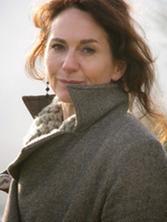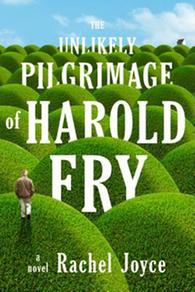
Rachel Joyce, writer of more than 20 plays for BBC Radio 4, took a moment to speak with us about her debut novel, The Unlikely Pilgrimage of Harold Fry. Joyce lives in Gloucestershire, England, where she is at work on her second novel.
What inspired you to write The Unlikely Pilgrimage of Harold Fry?
It began as a radio play that I wrote for my father seven years ago when he was dying of cancer. I knew he would never hear my play--and he didn't--but I wanted to do something for him. I wanted to write something with my heart in it that would also make him laugh. I loved making my dad laugh. I also believe that stories, poems, myths and phrases are part of who we are. Sometimes it is hard to know where exactly they have come from. They are simply in the air.
 Tell us about the process of changing that radio play into a novel.
Tell us about the process of changing that radio play into a novel.
A radio play is about 7,500 words and my book is over 85,000--so you have more words at your disposal! And that means you can go to places you can't with a radio play--into the land, the sky, people's heads, and the past, too. Only the bare bones of the story are the same (and the radio budget only ran to three actors, so it was a much slimmer tale.) Even the ending is different. I think stories evolve, though. The longer you sit with them, the bigger they grow. One of the main things I have learnt from radio drama is about story. Every scene has to advance the plot. If it doesn't--no matter how beautiful you think it is--it has to go. I felt the same way about writing the book. The reader has to be gripped by the story from start to finish.
Was it difficult to get into the mindset of an elderly gentleman?
It didn't feel difficult at all to get into Harold's head. In fact Harold's head became a very pleasurable place to sit, and I still miss that. People have asked if Harold is my dad. My answer to that is that Harold is a little bit of my dad, and a little bit of me, and maybe (I hope) a little bit of us all.
How did you research Harold's 600-mile route?
Harold's route begins and passes through places I know, love or have passed myself. That is the way with this book--it has a lot of what I know or have seen. (This is true, too, of the people Harold meets.) But when I didn't know a place, I researched it very thoroughly. I studied maps, guidebooks, the Internet and photos. As I wrote the book, I had endless notes about Harold's journey. I knew which road he was on every day, as well as how many miles he had walked and where he slept. I knew the reader didn't always need to know these things but I also knew that I did. In the end I cut out the pages of our road map and stuck them in a long chain up two walls of our house. My husband rang one day--lost on the A46--and said, "The road map has jumped from page 5 to 38. Is this anything to do with you?"
Harold's pilgrimage requires great faith. What sustains you through great effort, such as your writing?
I think it is a combination of things, and some of them are very ordinary. There is the fact that you sit with the story every day and you chip away at a bit more of it--even if the writing is not good. Sometimes you have to make mistakes in order to see that they are mistakes.
Tell us about your next project.
I am working on a very different story, about a young boy who has everything ahead, and an older man who has lost it all. The boy believes his mother has done something terrible from which he must save her; the man can't form relationships.
What I can't get away from, I suppose, is my "voice," my way of seeing the world. Having written a whole novel about being outside, about a relationship with the land, I also have to keep shoving my new characters inside houses. That bit I find hard. They seem to want to keep rushing outside. --Jaclyn Fulwood, blogger, Infinite Reads

